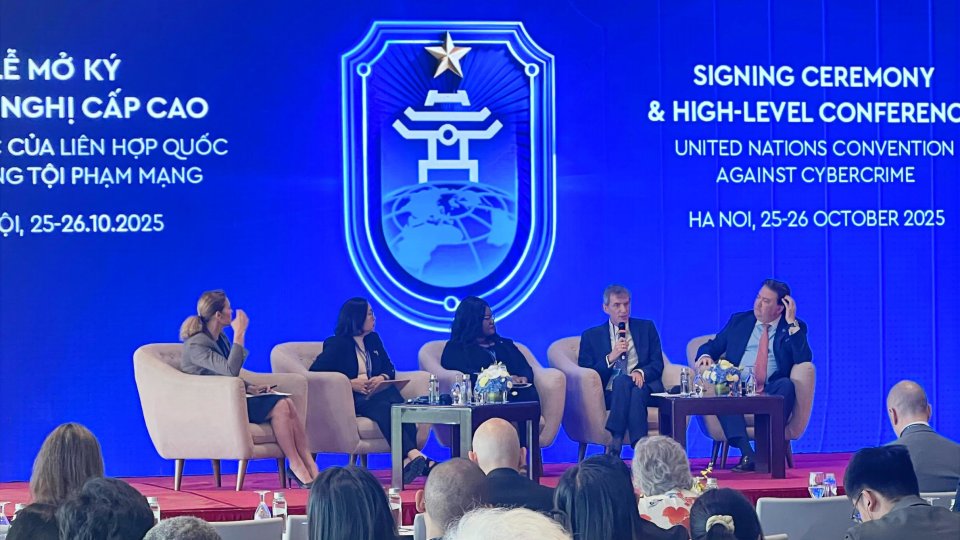SWGfL were honoured to contribute at the UN Cybercrime Convention in Hanoi, sharing frontline experience from the Revenge Porn Helpline and StopNCII.org as part of ongoing partnership efforts to strengthen global responses towards image-based abuse.
The signing of the UN Cybercrime Convention in Hanoi marked a turning point in global cooperation on cybercrime, with non-consensual intimate image abuse recognised throughout the programme as one of the most urgent and pervasive digital harms impacting people worldwide.
Sixty-four countries signed the Convention on the opening day, with a further eight joining in the following 24 hours, signalling a strong shared commitment to improving how nations respond to cyber-enabled abuse. Across plenary sessions and side-events, the prominence of discussions on NCII reflected a growing international understanding that image-based abuse is no longer a peripheral concern, but a central challenge in safeguarding our digital spaces.
SWGfL attended the Convention in support of the UK’s engagement through the Foreign, Commonwealth & Development Office and the Home Office, contributing the UK’s practical experience in responding to NCII. This work is grounded in more than a decade of delivering the Revenge Porn Helpline and establishing and operating StopNCII.org. Across four panel discussions on 26 October, we joined representatives from government agencies, international organisations, NGOs and digital platforms to explore how systems of prevention, support and takedown can be strengthened and adapted across different regional contexts.
Bringing Practice to Policy
Behind every policy discussion on NCII are individuals trying to regain control over their images and their sense of security. Insights and evidence from the Revenge Porn Helpline helped to bring this reality into focus, illustrating not only the scale of the harm but the importance of clear, reliable pathways for those seeking help. The presentation of StopNCII.org built on this by demonstrating how technology and partnership can work together to prevent or reduce further harm, while ensuring that privacy and agency remain at the centre of the process.
Many of the governments and organisations represented in Hanoi are at the early stages of developing legislation, support structures or platform cooperation models. The conversations repeatedly focused on the “how”: how services are structured, how agencies collaborate, and how responses adapt as synthetic and manipulated imagery continues to evolve. What emerged was the value of experience that has been tested in practice, not as a template to be replicated directly, but as a reference point for building sustainable, victim-centred systems.
Working in Partnership
Importantly, our work in Hanoi formed part of an ongoing partnership with UNODC, particularly in the development of its emerging Global Strategy on NCII, where StopNCII.org and national capacity-building models are playing a central role. This partnership reflects shared priorities: strengthening multi-agency collaboration, improving victim support and guidance, and enabling governments and civil society to build the technical and organisational capacity required to respond effectively.
The discussions throughout the Convention reinforced that cooperation is not optional, it is foundational. Effective response to NCII relies on aligned action across public agencies, platforms, NGOs and international bodies, with each stakeholder contributing to a coordinated whole. The work ahead will require patience, shared learning and continued refinement as harms and technologies evolve.
Strengthening Responses
As the Convention moves into implementation, SWGfL will continue to support this work both in the UK and internationally. Current developments, including the National Model Response and the ongoing work in removing NCII across a global scale, are designed to strengthen capacity, accelerate collaboration, and provide practical pathways for countries seeking to develop or enhance their responses to image-based abuse.
The momentum in Hanoi was shaped by urgency, openness and a willingness to collaborate. Our role now is to continue contributing our experience where it can be of most use, working alongside partners globally to support responses that are practical, victim-centred and sustainable.






